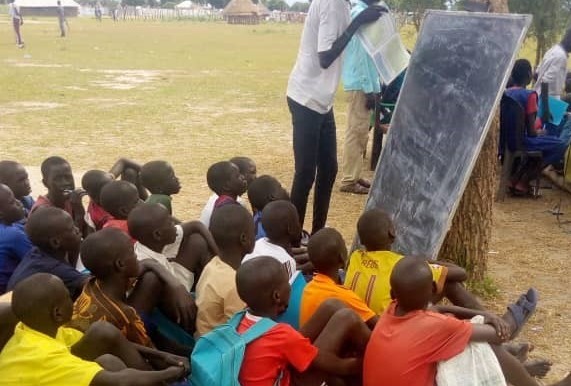Education is a legitimate right for any citizen in South Sudan according to the Bill of Rights in the country’s first post-independence constitution, but the civil war which broke out in 2013 came with attendant challenges that negatively impacted and continue to debilitate the sector.
Many learners could not continue going to school due to displacement occasioned by the war and many teachers even abandoned the profession altogether due to safety concerns and lack of or delayed pay. The government’s priorities were upended and monies were diverted to the war at the expense of vital sectors like education and health.
Lawyer Khansa Ibrahim says that the right to education is stipulated in Article 29 of the Constitution of South Sudan and that government education institutions must provide it to all citizens without discrimination.
"The right to education must be provided by state institutions without any discrimination to ensure that all citizens of South Sudan receive an education," Ibrahim said.
An elderly lady, Mama Julia John, said that after the outbreak of war in 2013, education declined due to several challenges presented by conflict and that many parents, who could afford it, relocated their children and entire families outside the country.
"Families faced difficulties after the war, especially security challenges,” Mama Julia said, “When children go to school and at the same time there are sounds of bullets in the locality, automatically parents become unsure about the safety of their children and this fear still exists in many parents. So, security must be improved."
Professor Ben Tombe says education in South Sudan suffers greatly due to the weakness of the teaching cadre who abandoned the profession because of poor salaries and deplorable working environments.
"Schools face many challenges due to the weakness of the cadres, most of them left teaching and entered the market to provide a decent living for their families. The school environment has become pitiable and must be improved as well," Prof. Tombe said.
According to a father, Andrew Gore, the poor remuneration of government employees is one of the biggest issues impeding them from sending their children to school.
"As a government employee, my salary is not enough to pay school fees to educate my children and this is one of the biggest challenges facing all parents, including teachers, who leave public schools and look for private schools to improve their conditions," Gore said.
A student, Samuel Subek, said that one of the main challenges faced by learners is the exorbitant tuition fees and that without support, many drop out of school.
"School fees are exorbitant. This is what makes us face many challenges as there are many fees and study requirements that make it difficult for students,” Subek said.
Another student, Viola Ono, said her education was negatively affected by the war and chronic absenteeism by teachers.
Ono said: "Our studies have been irregular because of security instability and teachers are absent and sometimes late and this is what affects our education."
An activist, Bosco Simi, says improving the education sector requires several interventions starting with improving the pay of teachers, education infrastructure, and training of more teachers.
"There is a lot that must be done to improve education; raise teachers' salaries, improve the school environment, train human resources to provide the best for children, and modernize education," Simi recommended.
The Minister of General Education and Guidance in Central Equatoria State, Cerisio Zakaria, says the state has done a lot but that there are many challenges in the education sector such as poor salaries in public schools which makes teachers leave the profession.
"The state has plans to improve education by raising salaries and improving the school environment. This year, if we do not complete solving 40 percent of the obstacles facing education, God willing, next year we will manage 50 or 60 percent of these challenges," Minister Zakaria said.
There is no doubt about the importance of education in nation-building and there are many challenges that impede the delivery of education services in various parts of the country due to the recent conflicts. There however remains hope that all these obstacles and challenges will be overcome and the conditions of teachers and the school environment improved for a better future for all citizens of South Sudan.




